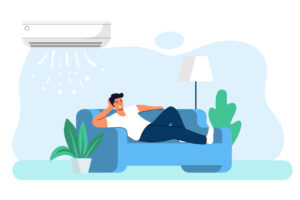When it’s time for an HVAC system upgrade or replacement, Augusta, Georgia, homeowners should carefully consider which HVAC system will be best for their residences. Two of the most popular central air conditioner or heat pump options are split systems and packaged units, but you might not understand what the difference is between the two. Keep reading to learn how split and packaged HVAC systems differ and which might be the best option for your home.
Installation
Most parts of a packaged system are put together at the factory, making their installation faster, easier, and perhaps less costly than that of split systems. Even with a pitched roof, you can have a platform built to support your HVAC system. Ductless systems are ideal for new additions because they let you avoid the expense of adding new ducts and replacing your current system with a larger unit.
In contrast, the installation of a split system is slightly more complicated. A split system must be installed in two separate places and charged with refrigerant. Split systems also need refrigerant lines to connect their components and work properly. These are very common systems with the air handler inside the building and the refrigeration component (compressor) outside.
Maintenance
When it comes to the routine maintenance of your system, getting a split system checked by a professional will usually take a little longer. This is because your technician will be looking at the two different components. In many older homes, the air handler which is the indoor unit is up a ladder in the attic or down in the basement. But here’s the good news: Because some parts of a split system are indoors, they may be less vulnerable than packaged systems to damage and wear and tear from storms, inclement weather, and dirt and debris.
Packaged units are usually more accessible, but that doesn’t always mean maintenance is easy. If the packaged system is located on the roof, accessing the roof to inspect a packaged system or change the air filter could prove a little more difficult, as well.
You can protect both types of systems by keeping all outdoor components clear of debris, like grass clippings or leaves.
Space Requirements
A split system has a metal cabinet with the condenser and compressor outdoors, usually on a nearby concrete platform. It also has an indoor air handler that contains a fan and an evaporator coil. In contrast, a packaged unit has just one cabinet for the evaporator coil, condenser, compressor, and most other parts.
With a packaged system, you can use the space that would be needed for an indoor air handler with a split system for extra storage. Packaged systems are ideal for places without a lot of interior or exterior space — you can even have your system installed on your roof. Many commercial buildings have large, flat roofs, so you won’t see a packaged HVAC system from the ground.
Instead of a single large split system, you can also have more than one packaged system installed in different locations, making your heater and air conditioner less noticeable. You can also easily hide systems in your yard with fencing, a trellis with vines, or other landscaping.
Noise Levels
A split system’s indoor unit can make annoying noises, and if it’s malfunctioning, it could be louder. In contrast, a packaged heating and air conditioning system that’s located completely outdoors shouldn’t make enough noise outside to disturb you inside. With both systems, however, you’ll occasionally hear air moving through the ductwork. If you notice loud banging, screeching, or whistling sounds, you very likely have a ductwork problem.
Doc Savage Heating & Air Conditioning, Inc. is a Trane Comfort Specialist with more than 40 years of HVAC experience. We can help you with selecting, installing, and maintaining a packaged or split system and a variety of other HVAC equipment. For outstanding, friendly customer service and a 100 percent customer satisfaction guarantee, call us anytime at (706) 793-4131.
Image provided by Shutterstock



